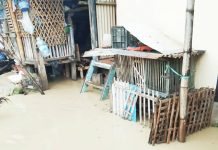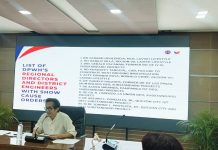
BACOLOD City – With several local government units (LGUs) in Negros Occidental reeling from infestations of the red striped soft scale insect (RSSI), neighboring Negros Oriental has pledged full support to the Sugar Regulatory Administration’s (SRA) campaign against the sugarcane pest.
Gov. Manuel “Chaco” Sagarbarria made the commitment during a technical discussion convened by the SRA with provincial and municipal officials at the Negros Oriental capitol recently.
“The provincial government will actively work with SRA to implement pest management strategies and mobilize resources to safeguard our sugar industry,” Sagarbarria said, stressing that sugar remains a vital economic driver and source of livelihood for thousands of Negrenses.
The meeting, spearheaded by the SRA’s Research, Development, and Extension (RDE) Department, aimed to strengthen cooperation with Negros Oriental LGUs in tackling the growing RSSI infestation.
SRA officials led by Dr. Ma. Lourdes Almodiente, OIC-Deputy Administrator for RDE, and Helen Lobaton, RDE-Visayas Manager III, outlined the agency’s intervention programs and called for collective action among national agencies, LGUs, and industry stakeholders to protect one of the country’s top sugar-producing regions.
To enhance technical understanding, Aljun Perez, Science Research Specialist II and resident entomologist of the SRA-La Granja Agricultural Research and Extension Center (LGAREC), discussed the biology, infestation patterns, and recommended management practices for RSSI. He was followed by Mikko Libo-on, Agriculturist I of the RDE, who presented the latest Visayas-wide infestation data as of September 11, highlighting the urgency of proactive interventions in Negros Oriental.
To curb the spread of RSSI, the SRA recommended three priority measures: de-trashing of old and infested leaves, weed management to remove alternate pest hosts, and judicious insecticide application in heavily infested areas. The agency emphasized that under Integrated Pest Management (IPM), chemical control must remain a last resort due to pesticide resistance concerns.
SRA researchers at LGAREC are also conducting field trials using beneficial fungi as a biological control agent against RSSI. Once proven effective, the fungi will be mass-produced and distributed free to farmers, planters’ associations, sugar mills, and other stakeholders.
Almodiente further cited SRA’s regulatory initiatives, including Sugar Order No. 6 (2024–2025) and Memorandum Circular No. 9 (2025), which restrict the transport of sugarcane planting materials to prevent pest spread.
The meeting concluded with a unified commitment to strengthen surveillance, capacity-building, and farmer education programs on pest prevention and management.
SRA stressed that ensuring the sustainability of the sugar industry will require not only research and innovation but also collective action from farmers, LGUs, and national government agencies.
With the looming RSSI threat, the strengthened partnership between the SRA and Negros Oriental marks a crucial step in safeguarding the resilience of the province’s — and the nation’s — sugarcane industry./PN






